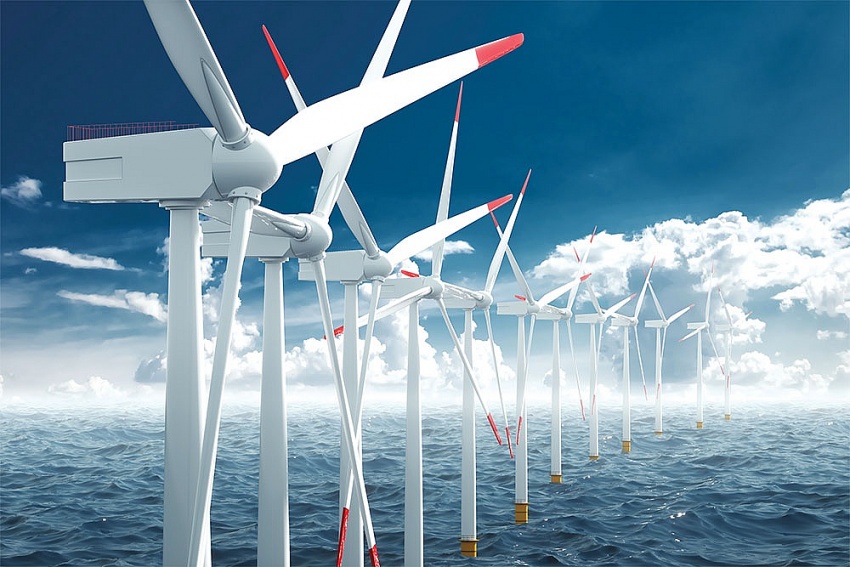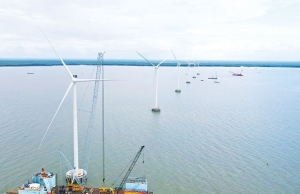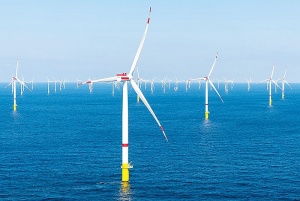Moves made to tighten up offshore approval rulings
The proposal was made in October after the ministry (MoNRE) received a range of interest to develop offshore wind power in Vietnam from both local and foreign investors, but there are no clear regulations on offshore surveys and assessment project capabilities as well as requirements for technical details.
“There are still no specific regulations on procedures and time to deal with the approval of measurement, observation, investigation, survey and assessment of marine resources. Besides, opinions are divided as to whether organisations and individuals are permitted to conduct wind measurements, geological and topographical surveys at sea,” the MoNRE admitted in the proposal.
 |
| Some rules over permission to conduct surveys at sea are still unclear, Photo: Shutterstock |
To remove the current barriers to efficient permitting of site investigations and the award of offshore wind energy areas, the MoNRE proposes amending and supplementing a number of articles in Decree No.11/2021/ND-CP dated February 2021 assigning certain sea areas to individuals for use of marine resources. Current restrictions would be changed to allow foreign organisations and individuals to conduct offshore surveys.
The amendments, if approved, would establish specific restrictions on the documentation, methods, and timing for consent on offshore site investigations, which would be set at three months from the date of application. The ministry also suggests that survey activities for numerous or overlapping proposed projects in the same area be carried out collaboratively.
In terms of project capacities and government bodies’ responsibilities, the MoNRE proposes that the Ministry of Industry and Trade (MoIT) is in charge of developing and communicating regulations on approved marine areas for site investigations, the expected capacity for each sea area, and the maximum capacity for an offshore wind project. Criteria for selecting developers would be developed and promulgated by the Ministry of Planning and Investment, while the MoNRE would take on identifying and designating offshore areas with potential for wind power development and submitting them to competent authorities, according to the MoNRE’s proposal.
As of the end of August, there were 55 proposals to survey offshore wind power, of which most were from domestic investors. A total of more than 100GW of 19 projects are proposed by the investor to measure wind and conduct geological and topographic surveys at sea to set up offshore wind power projects. The minimum proposed capacity is 0.5GW and the maximum is 6GW, according to the ministry.
“Policymakers must act now to prepare the road for the expansion of offshore wind in Vietnam. A proactive offshore wind plan would also provide Vietnam with a competitive advantage in the region, as the country will be recognised as a pioneer for this clean energy technology in Southeast Asia,” said Stuart Livesey, CEO of the La Gan offshore wind project in the south-central province of Binh Thuan.
He suggested that the government sets a more welcoming investment environment and legal framework that selects and encourages experienced international developers to invest and shape the market.
“For Vietnam to leap 20-30 years into offshore wind experience is unrealistic, so we propose transitional mechanisms established with a series of pilot projects, which would give Vietnam time to learn with the industry and adapt more rigorous regulations and competitive auctions for the future. However, this will take time,” Livesey added. ”Pilot projects first, competitive auctions at a later stage, then Vietnam will really maximise its offshore wind potential.”
Pham Nguyen Hung, deputy director of the Electricity and Renewable Energy Authority under the MoIT, admitted that it takes 7-8 years to implement an offshore wind power project.
“For a new market like Vietnam, the market faces obstacles that necessitate the improvement of current infrastructure, institutional processes, and supply chains to develop and set up a competitive renewable energy market,” Hung said.
A report on harnessing the country’s offshore wind potential released by Mayer Brown in September noted that the challenges to this fledgling industry in Vietnam were numerous, and it would be easy to become pessimistic about the prospects.
“However, it is worth remembering that such challenges are not necessarily unique to Vietnam, with various countries and regions across the world grappling with similar issues. For example, streamlining and fast-tracking an overly lengthy and burdensome approval process is a target of many, as is managing the grid issues inherent in bringing multi-GW of offshore wind projects online,” the report noted.
The latest draft that the MoIT released in May outlines Vietnam’s target for renewable energy to become the country’s primary source of energy, with an upper limit of 23GW of installed wind capacity by 2030. It involves 16GW from onshore or coastal wind projects and the remaining 7GW from offshore wind projects. By 2045, these wind targets will have risen to 55.95GW for onshore wind and 66.5GW for offshore wind.
 | Survey overlap potential irks wind power developers Due to several legal pitfalls, conflicts may occur among wind power investors, both onshore and off, as they take part in surveying activities for their potential projects. |
 | Investors wait for wind power administration system Offshore wind offers a route to diversify the energy system in a cost-effective way, given the technology’s unmatched track record in driving down costs in the context of the major energy crisis facing the world today. |
 | Offshore wind bonanza within reach for the country Vietnam’s offshore wind potential comes with its own set of hurdles and restrictions. David Harrison, partner at Mayer Brown’s Vietnam Office, talked with VIR’s Nguyen Thu about wind energy’s role in Vietnam’s energy transition. |
What the stars mean:
★ Poor ★ ★ Promising ★★★ Good ★★★★ Very good ★★★★★ Exceptional
 Tag:
Tag:
Related Contents
Latest News
More News
- Bac Ai Pumped Storage Hydropower Plant to enter peak construction phase (January 27, 2026 | 08:00)
- ASEAN could scale up sustainable aviation fuel by 2050 (January 24, 2026 | 10:19)
- 64,000 hectares of sea allocated for offshore wind surveys (January 22, 2026 | 20:23)
- EVN secures financing for Quang Trach II LNG power plant (January 17, 2026 | 15:55)
- PC1 teams up with DENZAI on regional wind projects (January 16, 2026 | 21:18)
- Innovation and ESG practices drive green transition in the digital era (January 16, 2026 | 16:51)
- Bac Ai hydropower works stay on track despite holiday period (January 16, 2026 | 16:19)
- Fugro extends MoU with PTSC G&S to support offshore wind growth (January 14, 2026 | 15:59)
- Pacifico Energy starts commercial operations at Sunpro Wind Farm in Mekong Delta (January 12, 2026 | 14:01)
- Honda launches electric two-wheeler, expands charging infrastructure (January 12, 2026 | 14:00)






















 Mobile Version
Mobile Version